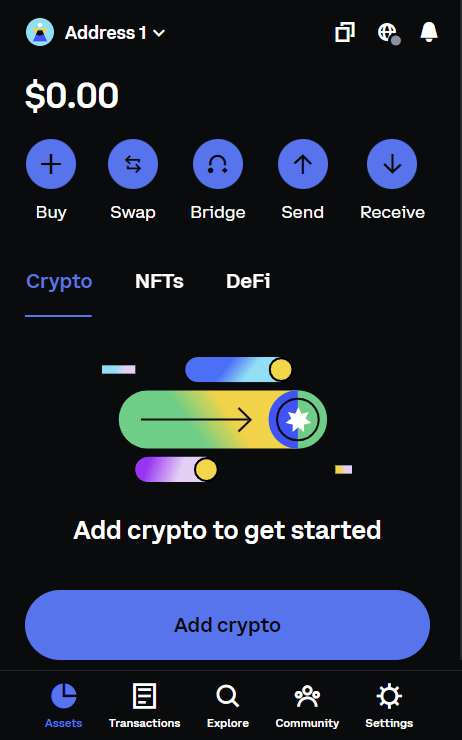- Make Crypto Simple
- Posts
- Is Your Crypto Really Yours?
Is Your Crypto Really Yours?
Not your keys, not your crypto!

Make Crypto Simple
Crypto News and Concepts Made Simple - Straight to your inbox, every Monday.
Is your Crypto Safe?
If you hold your cryptocurrency on an exchange like Coinbase, Binance, or Kraken, you could be at risk.
Keep reading to find out why:

🌟 Centralized Exchanges 🌟
Centralized Exchanges (CEXs)
CEXs are the most popular way to buy and sell cryptocurrency.
Ease of Use: Typically user-friendly, these platforms are designed for ease of use, making them suitable for beginners in the cryptocurrency space. They provide a simple interface for trading, buying, and selling digital assets.
Integrated Services: Exchanges offer a range of integrated services including market analysis, easy conversion between different cryptocurrencies, and sometimes fiat currency support.
Centralized Control: Exchange accounts are managed by centralized platforms like Coinbase, Binance, or Kraken. The exchange has control over the private keys of the wallets, essentially managing the cryptocurrency on behalf of the user.
Custodial Wallets: The wallets provided by exchanges are custodial, meaning the exchange keeps the cryptocurrency in their control. Users access their funds through their account but do not have direct control over the wallet’s private keys.
When you store your crypto on an exchange, you DO NOT own that cryptocurrency. All you have is an IOU from the exchange. The exchange your using holds your coins in a wallet with the rest of its clients crypto.
They hold the keys to these coins. You do not. This means that you do not have control.
If the exchange gets hacked, you’re screwed. In the case of FTX, the company could also steal your coins and use them for their own purposes.
Centralized exchanges offer easy access to crypto, but are hiding a dark secret… your crypto on exchanges isn’t actually yours!

🌌 Self Custodied Wallets 🌌
Self-custodied wallets represent a more personal approach to managing cryptocurrency, placing full control in the hands of the individual user.
Personal Control and Security: In self-custody, users have complete control over their cryptocurrency. They are responsible for their private keys, which are not shared with any third-party service. This autonomy enhances security, as the risk of exchange hacks or mismanagement does not affect these wallets.
Direct Ownership: Unlike with centralized exchanges, holding crypto in a self-custodied wallet means you truly own your digital assets. There are no IOUs; you have direct access to and control over your cryptocurrency.
Increased Responsibility: With great power comes great responsibility. Users must ensure the safekeeping of their private keys. Losing access to these keys can result in the permanent loss of cryptocurrency.
No Third-Party Risks: Self-custody eliminates the risk of losing your assets due to the failure or fraudulent activities of a third-party service, like in the case of the FTX incident.
Varied Wallet Options: There are several types of self-custodied wallets, including hardware wallets, software wallets, and paper wallets, each offering different levels of convenience and security.
Technical Knowledge Required: A certain level of technical understanding is necessary to effectively manage a self-custodied wallet. Users need to know about wallet backup, security best practices, and sometimes even blockchain technology basics.
Complete Transactional Freedom: Self-custodied wallets allow for unrestricted access to the cryptocurrency market. Users can send, receive, and store their digital assets without any limitations or waiting periods imposed by a third party.
No KYC or AML Requirements: Since there's no intermediary, self-custodied wallets do not require compliance with Know Your Customer (KYC) or Anti-Money Laundering (AML) regulations, offering more privacy.
Potential for Greater Anonymity: Depending on the wallet type and how it is used, self-custodied wallets can offer greater levels of anonymity compared to centralized exchanges.
Self-custodied wallets put the power back into the hands of the user.

🌐 Browser Wallets 🌐
One type of self-custodied wallet is a browser extension wallet. The easiest and safest way to access them is on Google Chrome.
To make sure you download the right one, it’s recommended to go the website for the wallet provider your chose and download the extension directly from there.
Here’s an example from Coinbase Self Custody Browser Wallet:

Once you download the wallet, here’s what it looks like:

When you click create a new wallet, you’ll be prompted to back up your wallet. You’ll be given 12 code words that need to be written down on a piece of paper, in order, and stored somewhere safe.

DO NOT:
Share these words with anyone
Lose the paper with the words
Store the words online (take a picture on your phone, write it in your phone notes, a word doc, etc)
This secret recovery phase is THE ONLY WAY to recover your wallet if you forget your password. DO NOT LOSE THESE WORDS.
Once you get into the wallet, here’s what the interface looks like.

Need help moving your coins from an exchange to a wallet?
Book a 1 on 1 consulting session and I’ll help you.
For a limited time, they’re 100% FREE. Claim yours NOW.
Thank you for reading Make Crypto Simple.
Sincerely,
Chris Schawel
The content provided in this newsletter is for entertainment purposes only and should not be construed as financial advice. All information, including but not limited to market analysis, price predictions, and investment strategies, is purely speculative in nature. We strongly recommend conducting your own research and consulting with a qualified financial advisor before making any investment decisions. We are not responsible for any losses incurred as a result of the information presented in this newsletter.